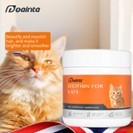Lecithin supplements for cats benefits advice, Pet health tips, Understanding home animal nutrition guide
Lecithin Supplements for Cats: Understanding the Benefits
12 October 2023
As responsible pet owners, we are always striving to find ways to improve the health of our beloved cats. In addition to a balanced diet and regular veterinary care, a number of supplements are available to safeguard your cat’s health.
One such supplement that is becoming increasingly popular is lecithin. Derived from natural sources, lecithin not only plays an important role in animal nutrition. Lecithin is also an important ingredient in pet foods (from dogs, cats and small animals to birds), ensuring good digestibility and ease of digestion, an animal-friendly texture and a strong immune system. Can provide potential benefits for cats, but it is important to understand its uses, precautions and potential side effects before incorporating it into a cat’s diet.
What is Lecithin?
Lecithin is a naturally occurring fatty substance that is found in various plant and animal tissues. It is composed of phospholipids, the “third nutrient” along with proteins and vitamins. It is also known as “brain gold”. It plays a vital role in cell structure and function. Lecithin is usually derived from soy, egg, sunflower or animal products.
It is often used as an emulsifier in food manufacturing, but is also very beneficial for small animals. Not only does lecithin contain hairdressing ingredients, but it is also rich in vitamins and antioxidants, and lecithin itself has the ability to break down emulsified fat, which is very beneficial to the cat’s body.
What are the benefits of Lecithin for cats?
So how can Lecithin help your cat? Here are some of the benefits of Lecithin for cats.
1. Thicker and smoother coat, reducing cat’s fur lumpy
Lecithin contains essential fatty acids, such as omega-3 and omega-6, which are beneficial in maintaining healthy skin and a shiny coat. These fatty acids can help reduce inflammation, relieve dry skin problems and enhance the overall appearance and texture of the coat, resulting in a thicker, shinier and smoother coat
2. Prevent hairballs
Fat binds the hairs in the stomach together to form a sticky, usually smelly, gooey mess known as a hairball. Lecithin is a fat emulsifier: it emulsifies the fat that binds the hairballs, allowing the cat to expel the ingested hair.
3. Supports brain function
The phospholipids in lecithin (such as choline) are important for cognitive health. Choline is a precursor to acetylcholine, a neurotransmitter involved in memory and learning. Supplementation with lecithin can support brain function in cats, especially in older felines or those with cognitive problems.
4. Promotes energy absorption and turnover
Lecithin acts as an emulsifier, helping to break down dietary fats and improve their absorption. By enhancing fat digestion, lecithin can help cats that suffer from digestive problems or have difficulty absorbing essential nutrients from their diet.
5. Improves the immune system
Lecithin contains antioxidants that help fight free radicals and reduce oxidative stress. By supporting the immune system, lecithin can help boost a cat’s natural defenses against infection and disease.
How much Lecithin should I give my cats?
Always follow product instructions and veterinary recommendations for the amount to feed your cat.
Lecithin is available in various forms, such as capsules, granules, or powder. Each product may have different concentrations and recommended dosages, so it’s important to follow the instructions provided by the manufacturer.
Generally, for cats, lecithin supplements are often administered in small amounts. It is typically recommended to start with a low dosage and gradually increase it if necessary, while closely monitoring your cat’s response. The dosage can range from a few hundred milligrams to a few grams per day, depending on the formulation and the specific needs of your cat.
Side effects and precautions of Lecithin
If your cat is taking any medications, be sure to inform your veterinarian before using lecithin or any new supplements to avoid potential complications. This is because lecithin may interact with certain medications, including anticoagulants or blood-thinning drugs.
Dosage
Be careful with the dose of lecithin; an overdose of lecithin may cause gastrointestinal distress and even pancreatitis in cats, which may manifest as diarrhea, vomiting, abdominal discomfort and loss of appetite.
Allergic
Also note that some cats have allergic reactions to lecithin. Signs of allergic reactions include itching, rash, hives, swelling (especially around the face and neck), and difficulty breathing.
Lecithin supplements for cats benefits conclusion
Lecithin supplements offer potential benefits for cats, including promoting healthy skin and coat, supporting brain function, aiding digestion, and boosting the immune system. However, it is crucial to consider the quality, dosage, and potential side effects before incorporating lecithin into your cat’s routine.
Always consult with your veterinarian before starting any new supplement regimen to ensure it is appropriate for your cat’s individual needs. With proper care, attention, and the right supplements, you can help your feline friend lead a happy and healthy life.
Comments on this guide to Lecithin supplements for cats benefits article are welcome.
Building Articles
GPS Dog Fence Vs In-ground Dog Fence
GPS Dog Fence Vs In-ground Dog Fence
Comments / photos for the Lecithin supplements for cats benefits advice page welcome


